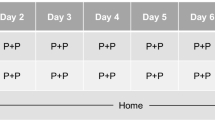Abstract
Driving a car is a daily activity that can be significantly affected by sleepiness and reduced alertness. Sleepiness may significantly impair driving and increase the risk of having traffic accidents. Sleepiness can have many causes, including sleep loss, insomnia, but also monotonous driving circumstances and prolonged driving may increase driver sleepiness. Another cause of driver sleepiness may be the use of central nervous system (CNS)-drugs. This chapter summarizes the main findings obtained with the Dutch on-road driving test examining the effects of alcohol and CNS-drugs on driving. The data show that CNS-drugs may have a negative impact on driving ability, however, he magnitude of impairment differs between drugs, and often physicians have a choice to prescribe a drug that has little or no impairing effects on driving ability. The latter is important since most people who use CNS-drugs are outpatients that are therefore likely to drive a car.
Access this chapter
Tax calculation will be finalised at checkout
Purchases are for personal use only
Similar content being viewed by others
References
Pandi-Perumal SR, Verster JC, Kayumov L, Lowe AD, Santana MG, Pires MLN, Tufik S, Mello MT (2006) Sleep disorders, sleepiness and traffic safety: a public health menace. Braz J Med Biol Res 39:863–871
De Mello MT, Narciso FV, Tufik S, Paiva T, Spence DW, BaHamman AS, Verster JC, Pandi-Perumal SR (2013) Sleep disorders as a cause of motor vehicle collisions. Int J Prev Med 4:246–257
Verster JC, Mets MAJ (2009) Psychoactive medication and traffic safety. Int J Environ Res Public Health 6:1041–1054
Verster JC, Taillard J, Sagaspe P, Olivier B, Philip P (2011) Prolonged nocturnal driving can be as dangerous as severe alcohol-impaired driving. J Sleep Res 20:585–588
Sagaspe P, Taillard J, Akerstedt T, Bayon V, Espié S, Chaumet G, Bioulac B, Philip P (2008) Extended driving impairs nocturnal driving performances. PLoS One 3:e3493
O’Hanlon JF, Haak TW, Blauw GJ, Riemersma JBJ (1982) Diazepam impairs lateral position control in highway driving. Science 217:79–81
Verster JC, Roth T (2011) Standard operation procedures for conducting the on-the-road driving test, and measurement of the standard deviation of lateral position (SDLP). Int J Gen Med 4:359–371
Verster JC, Roth T (2013) Vigilance decrement during the on-the-road driving tests: the importance of time-on-task in psychopharmacological research. Accid Anal Prev 58:244–248
Mets MAJ, Ketser S, Blom C, van Gerven M, van Willigenburg GM, Olivier B, Verster JC (2011) Positive effects of Red Bull® energy drink on driving performance during prolonged driving. Psychopharmacology 214:737–744
Mets MAJ, Baas D, van Boven I, Olivier B, Verster JC (2012) Effects of caffeine versus placebo on prolonged highway driving. Psychopharmacology 222:337–342
Verster JC, Roth T (2012) Drivers can poorly predict their own driving impairment: a comparison between measurements of subjective and objective driving quality. Psychopharmacology 219:775–781
Verster JC, Roth T (2012) Predicting psychopharmacological drug effects on actual driving (SDLP) from psychometric tests measuring driving-related skills. Psychopharmacology 220:293–301
Helland A, Jenssen GD, Lervåg LE, Westin AA, Moen T, Sakshaug K, Lydersen S, Mørland J, Slørdal L (2013) Comparison of driving simulator performance with real driving after alcohol intake: a randomised, single blind, placebo-controlled, cross-over trial. Accid Anal Prev 53:9–16
Davenne D, Lericollais R, Sagaspe P, Taillard J, Gauthier A, Espié S, Philip P (2012) Reliability of simulator driving tool for evaluation of sleepiness, fatigue and driving performance. Accid Anal Prev 45:677–682
Borkenstein RF, Crowther RP, Shumate RP, Ziel HB, Zylman R (1964) The role of the drinking driver in traffic accidents, 1964. Department of Police Administration, Indiana University, Bloomington, Indiana
Louwerens JW, Gloerich ABM, De Vries G, Brookhuis KA, O’Hanlon JF (1987) The relationship between drivers’ blood alcohol concentration (BAC) and actual driving performance during high speed travel. In: Noordzij PC, Roszbach R (eds) Alcohol, drugs and traffic safety. Excerpta Medica, Amsterdam, pp 183–192
Verster JC, Roth T (2012) Thirty years of Dutch on-the-road driving research: strengths and limitations of the highway driving test and future challenges. Curr Psychopharmacol 1:97–102
Ramaekers JG (2003) Antidepressants and driver impairment: empirical evidence from a standard on-the-road test. J Clin Psychiatry 64:20–29
Verster JC, Volkerts ER (2004) Antihistamines and driving ability: evidence from on-the-road driving studies during normal traffic. Ann Allergy Asthma Immunol 92:294–304
Verster JC, Veldhuijzen DS, Volkerts ER (2005) Is it safe to drive a car when treated with anxiolytics? Evidence from on-the-road driving studies during normal traffic. Curr Psychiatry Rev 1:215–225
Verster JC, Veldhuijzen DS, Patat A, Olivier B, Volkerts ER (2006) Hypnotics and driving safety: meta-analyses of randomized controlled trials applying the on-the-road driving test. Curr Drug Saf 1:63–72
Van Laar MW, Volkerts ER, Van Willigenburg APP (1992) Therapeutic effects and effects on actual driving performance of chronically administered buspirone and diazepam in anxious outpatients. J Clin Psychopharmacol 12:86–95
Veldhuijzen DS, Van Wijck AJM, Verster JC, Kalkman CJ, Kenemans JL, Olivier B, Volkerts ER (2006) The impact of patients’ psychotropic drug knowledge and warning labels on the decision whether to drive a car or not. Traffic Inj Prev 7:360–364
Mets MAJ, Alford C, Verster JC (2012) Sleep specialists’ opinion on sleep disorders and fitness to drive: the necessity of continued education. Ind Health 50:499–508
Author information
Authors and Affiliations
Corresponding author
Editor information
Editors and Affiliations
Rights and permissions
Copyright information
© 2014 Springer-Verlag Italia
About this chapter
Cite this chapter
Verster, J.C. (2014). Effects of CNS-Drugs and Alcohol on Driving Ability. In: Garbarino, S., Nobili, L., Costa, G. (eds) Sleepiness and Human Impact Assessment. Springer, Milano. https://doi.org/10.1007/978-88-470-5388-5_10
Download citation
DOI: https://doi.org/10.1007/978-88-470-5388-5_10
Published:
Publisher Name: Springer, Milano
Print ISBN: 978-88-470-5387-8
Online ISBN: 978-88-470-5388-5
eBook Packages: MedicineMedicine (R0)




